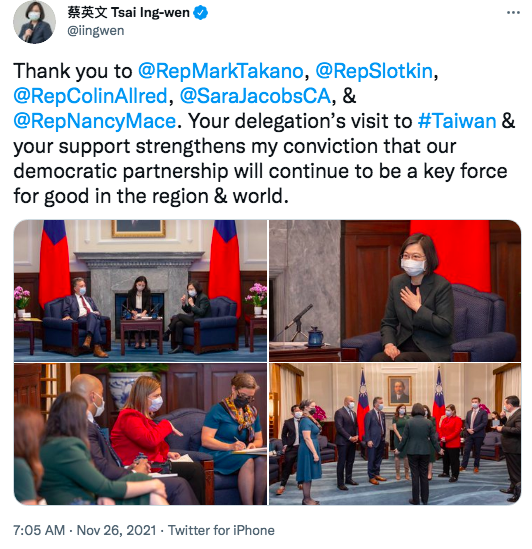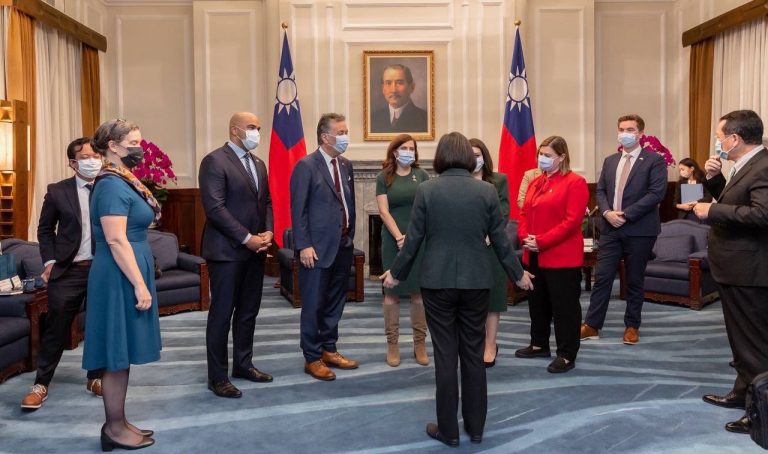Five U.S. lawmakers arrived in Taipei on Thursday, Nov. 25 to meet with government officials in regards to security matters. This was the second meeting between the U.S. and Taiwan in a month, raising protests from Communist China, which claims the democratically governed island is a rightful part of its territory.
People’s Republic of China (PRC) foreign ministry spokesman Zhao Lijian said in a daily press briefing on Nov. 26 that “the visit to Taiwan by certain US lawmakers gravely violates the one-China principle and stipulations of the three China-US Joint Communiqués and sends a seriously wrong signal of supporting the “Taiwan independence” separatist forces. China strongly deplores and firmly rejects this and has lodged solemn representation with the US side.”
Beijing also urged Taiwanese authorities to heed warnings and not seek support from other nations, stating that “attempting to solicit foreign support and rely on the US to seek independence will prove a dead end.”
Taiwan is officially governed as the Republic of China (ROC), which ran all of China prior to its 1949 defeat on the mainland by communist rebels.
The U.S. and Taiwan do not have formal diplomatic ties after the ROC’s seat was removed by the United Nations in favor of recognizing the PRC as representative of the “one China” in 1971.
Beijing has repeatedly warned other countries not to interfere with what it considers to be “internal affairs” between the PRC and Taiwan.
The de-facto American embassy in Taipei formally announced that the delegation would consist of Mark Takano, chairman of the House Committee on Veterans’ Affairs, Colin Allred, Elissa Slotkin, Sara Jacobs and Nancy Mace. The delegation’s visit was part of a thanksgiving trip that also visited Japan and South Korea, the embassy added.
According to the embassy’s statement: “The congressional delegation will meet with senior Taiwan leaders to discuss U.S.-Taiwan relations, regional security, and other significant issues of mutual interest.”
Takano praised the island as a “force for good” in the world during a meeting with President Tsai Ing-wen on Nov. 25. He further stated that under Tsai, the relationship between the U.S. and Taiwan has been more “productive than it has been in decades.”
“Our commitment to Taiwan is rock solid and has remained steadfast as the ties between us have deepened. Taiwan is a democratic success story, a reliable partner and a force for good in the world,” the chairman said.
Taiwan’s official Central News Agency confirmed that the trip was expected to focus on meetings with ROC defense officials as well as with Tsai. The U.S. has remained the largest international supporter of the island, providing valuable military training and weapons sales.
Success
You are now signed up for our newsletter
Success
Check your email to complete sign up
RELATED:
Taiwan Invited to US Democracy Summit, Drawing Protest From Beijing
Tsai wrote on a Nov. 26 Twitter post that the delegation’s visit and support of Taiwan continues to strengthen the “democratic partnership” between the two nations and is a key force for good in the region and the world.

President Joe Biden and U.S. Secretary of State Antony Blinken have also confirmed on several occasions that the U.S. and other democratic nations would come to Taiwan’s aid in the event that China used military force to overtake the island. However, the White House released a statement on Oct. 22 following Biden’s remarks that there was no change in U.S. policy toward Taiwan.
The statement read: “The U.S. defense relationship with Taiwan is guided by the Taiwan Relations Act. We will uphold our commitment under the Act, we will continue to support Taiwan’s self-defense, and we will continue to oppose any unilateral changes to the status quo.”














